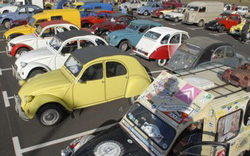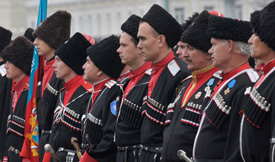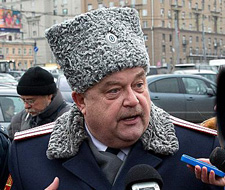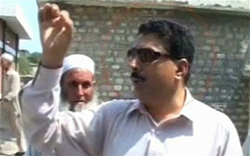News from Pakistan, France and Russia
Tuesday's World Events — Posted on December 4, 2012
PAKISTAN – Osama bin Laden doctor goes on hunger strike
ISLAMABAD | The Pakistani doctor jailed for his role in hunting down Osama bin Laden has gone on hunger strike after being put in solitary confinement and denied meetings with relatives, according to his lawyer.
Shakil Afridi was detained days after the American raid to kill the al-Qaeda leader when it emerged he ran a vaccination program for the CIA in an attempt to obtain DNA evidence from members of the bin Laden family.
His lawyer, Samiullah Afridi, said he was concerned for his client’s well-being after being informed of the hunger strike early last week.
“I am still trying to meet prison officials and Dr. Afridi to find out exactly what has happened but his relatives and the local media reports tell me this has happened,” he said. “He has been sentenced to 33 years in prison and this is not how to treat a prisoner. He is entitled to see his family. This is not a security issue.”
The discovery that bin Laden had lived in the city of Abbottabad, barely 30 miles from the capital Islamabad, was deeply embarrassing for Pakistan’s security forces.
While Dr. Afridi has been hailed a hero in the US, in Pakistan he faces a dangerous future.
Officially Dr. Afridi was convicted of aiding a militant group. However, few believe he was punished for anything other than working with a foreign intelligence agency.
Local media reports said Dr. Afridi had been placed in solitary confinement after giving an unauthorized interview to Fox News in September. In it, he accused Pakistan’s powerful Inter-Services Intelligence [ISI] agency of torture and of aiding militant groups.
FRANCE – ‘Old clunkers’ and classic cars to be banned from Paris

If the measures go ahead, classic old cars like 2CVs, Peugeot 205s and Renault 4Ls will be a thing of the past in the capital
PARIS | Classic cars, motorcycles and lorries are to be banned from Paris within two years under a plan to cut pollution that opponents claim is “anti-social, anti-suburban and anti-motorist.”
Under proposals presented to the city council on Monday, Nov. 12, Socialist mayor Bertrand Delanoë intends to outlaw by September 2014 the use of cars and utility vehicles more than 17 years old and lorries [trucks] or buses more than 18 years old.
Motorcycles built before 2004 will also be forbidden, as the mayor said they were the “most polluting and noisiest.”
The “old clunker” ban will apply to all vehicles inside the [highway] that surrounds the French capital.
If the measures go ahead, classic old cars like 2CVs, Peugeot 205s and Renault 4Ls will be a thing of the past in the capital, along with sputtering but charming old Vespas and other two-wheelers deemed too dirty to drive.
Fabien Breuvart, the proud owner of a silver 1990 Renault 4L…told Le Parisien newspaper that the plan would “exclude the poorest people from driving in the capital” and turn Paris into an “island for the rich.”
The Socialists insisted they would introduce “social” measures to help families and businesses update vehicles, including state subsidies to scrap old cars for new ones – a move experts dubbed unrealistic given the huge cost of such a measure at a time of austerity. [austerity: a situation in which there is not much money and it is spent only on things that are necessary]
Philippe Goujon, head of the Right-wing opposition UMP federation in the Paris council criticized the move as “anti-social, anti-surbuban and anti-motorist.” He said it was a purely political maneuver by Mr Delanoê to make Anne Hidalgo, the deputy he hopes will succeed him in 2014, appear “greener” than the Greens.
RUSSIA – Cossacks start patrolling Moscow streets

Nov 17: wearing traditional costumes, Cossacks gather for the regional Cossack community’s inspection
MOSCOW | Renowned for their sword-fighting prowess…in czarist Russia, the Cossacks are taking on new foes: beggars, drunks and improperly parked cars.
With the approval of city authorities, eight Cossacks clad in traditional fur hats and uniforms patrolled a Moscow train station [last] Tuesday looking for signs of minor public disturbances.
The Kremlin is seeking to use the once-feared paramilitary squads in its new drive to…appeal to nationalists.
The southern Krasnodar province – which includes Sochi, the site of the 2014 Winter Olympics – launched Cossack patrols in September to crack down on Muslim migrants from the neighboring Caucasus. Now they’ve made it to the Russian capital. …

Russian Cossacks patrol leader Igor Gurevich at Belorussky railway station in Moscow
Tuesday’s patrol was a test run on whether the group can become an armed and salaried auxiliary police force, with the power of arrest, patrol leader Igor Gulichev said. …
Gulichev’s group, which he said numbers up to 85, has patrolled southwestern Moscow with police approval for the past year, and has brought about 35 arrests. They are unpaid but receive free public transport passes and uniforms. Tuesday’s patrol was the first in central Moscow. …
Gulichev, whose official title is deputy ataman, a Turkic word meaning commander, said he expected his group’s responsibilities would soon expand to fighting drug trafficking and terrorism, mirroring the special relationship Cossacks had with the czars. ‘‘Cossacks have always been on the frontiers of the Russian empire, fighting foes and adversaries, illegal immigration – repulsing raids, as people say today,’’ he added. …
President Vladimir Putin was inducted into what is known as the Cossack host in 2005 and given the rank of Cossack colonel, previously held by imperial czars.
Russia plans to restore the functions Cossacks had in the imperial Russian army, where they were instrumental in repelling Napoleon’s invading army in 1812 and led pogroms against Jews. A 400,000-strong All-Russia Cossack Host directly subordinate to Putin is scheduled to be launched by the end of the year.
(The news briefs above are from wire reports and staff reports posted at London’s Daily Telegraph on Nov. 29 and Nov. 12 and Boston.com on Nov. 27.)
Background
PAKISTAN
- Shakil Afridi is a Pakistani physician who helped the CIA run a vaccine program in Abbottabad, Pakistan, in order to confirm Osama bin Laden's presence in the city by obtaining DNA samples.
- Details of the doctor's activities emerged during the Pakistani investigation of the deadly raid on Bin Laden's residence.
- He was arrested by the Pakistani military at the Torkham border while trying to escape the country days after the raid.
- In May 2012, Shakil Afridi was sentenced to 33 years imprisonment for treason, initially accused of his connection with the Bin Laden raid but later the Pakistani government accused him instead of having ties to a local Islamist warlord. This accusation is believed to be untrue in the Western world, and seen as a move by the Pakistani government to legitimize their imprisonment of Dr. Afridi.
FRANCE
- Other measures unveiled on Monday included one to erect toll barriers on cross-city motorways for lorries [trucks]. Eco-taxes will be also imposed for those using Paris' inner ring road, le périphérique, with heavy vehicles tracked via satellite or number plate recognition.
- The idea, the mayor said, is to "progressively and in a concerted manner" ban all trucks from driving in or around the capital.
- The speed limit on the ring road will be cut from 50mph to 43mph, while the number of 18 mph zones within Paris will be multiplied starting mid-2013.
- The measures require approval at ministerial level and the Paris Préfecture de Police. They are part of a plan to turn Paris into a Low Emission Zone, cutting emissions by 30 per cent by 2015. Failure to comply with European air pollution norms could see Brussels slap a 100 million-euro fine on France in 2016.
- The ban is the latest in Mayor Delanoë's war on "the hegemony [dominance] of the automobile" that has seen him introduce trams, bike and bus lanes and the popular cycle rental plan. In the past year, he has launched Autolib', the electric car rental system and begun pedestrianizing stretches of road along the banks of the Seine River.
- This has delighted most non-motorists, now the majority in Paris, but has dismayed car and taxi drivers, who claim traffic congestion is worse than ever.
- Critics said it failed to tackle the real problem in France: its heavy reliance on diesel, used by 60 percent of all vehicles and emitting three times as many harmful fine particles as petrol. The mayor's office sidestepped the issue by calling on the government to cut tax incentives to use diesel.
- Users of old cars are only thought to account for three per cent of the 4.5 million or so vehicles in the Paris region. (from the Telegraph news brief)
RUSSIA
- Cossacks trace their history in Russia back to the 15th century. Serving in the czarist cavalry, they spearheaded imperial Russia’s expansion in exchange for special privileges, including the right to govern their own villages. In the 2010 census, about 650,000 Russians declared themselves Cossacks.
- A government-backed Cossack political party held its first congress in Moscow the last weekend in November. Communists have called it a cheap attempt to siphon pensioners’ support from their party, which is widely known by the same acronym. Six other groups have applied to form splinter Cossack parties.
- Tuesday’s modest effort lasted barely more than an hour and yielded few rewards. Without the police supervisor that Russian law requires to oversee volunteer deputies, the Cossacks drove away two elderly beggars, an old woman selling dried wild mushrooms and one unlicensed trading stall before piling into a bus. The stall was back selling socks within hours.
- City authorities later distanced themselves from the Cossack patrol, even though officials had announced it widely the day before. Moscow’s central district administration and the city Cossack committee released a joint statement denying they had authorized the patrol and saying that the Cossacks did not have the authority to crack down on unlicensed traders or badly parked cars. (from the Boston.com news brief)
from wikipedia:
- Cossacks are a group of predominantly East Slavic people who originally were members of democratic, semi-military communities in Ukraine and Southern Russia.
- They inhabited sparsely populated areas and islands in the lower Dnieper and Don basins, and played an important role in the historical development of both Ukraine and Russia.
- By the 18th century, Cossack hosts in the Russian Empire served as buffer zones on her borders. However, the expansionist ambitions of the empire relied on ensuring the loyalty of Cossacks, which caused tension with their traditional freedom and independence.
- By the end of the 18th century, Cossacks were transformed into a special social estate (Sosloviye); they served as border guards on national and internal ethnic borders (as was the case in the Caucasus War) and regularly supplied men to conflicts such as the numerous Russo-Turkish Wars.
- In return, they enjoyed vast social autonomy. This caused them to be a part of a stereotypical portrayal of the 19th century Russian Empire both abroad and domestically.
- With the victory of the Red Army, the Cossack lands were subjected to extensive repression and the famine of 1932-33 (Holodomor).
- After the dissolution of the Soviet Union, the Cossack lifestyle and its ideas have made a return in Russia.
- In Russia's 2010 Population Census, Cossacks have been recognized as an ethnicity.
- There are Cossack organizations in Russia, Kazakhstan, Ukraine, Poland and the USA.

